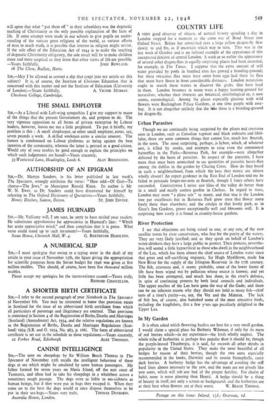River Protection
I see that objections are being raised to one, at any rate, of the new satellite towns by river conservators, who fear for the purity of the waters. They are very likely justified; and as they speak on behalf of London's water-drinkers they have a large public to protect. Their protests, neverthe- less, will sound a little hypocritical to those who dwell in the neighbourhood of the Lea, which has been almost the chief source of London water since that great and self-sacrificing engineer, Sir Hugh Myddleton, made his New River for the supply of the Islington Reservoir in the 17th century. The fish, crustacea and, it seems probable, some of the lower forms of life have been wiped out by pollution whose source is known; and yet little has been attempted, and much less done, in the river's defence, in spite of continuing protests by both local councils and individuals. The upper reaches of the Lea have gone the way of the Gade; and there can be no inherent reason why they should not hold as many fish—chief tests of a river's purity—as, say, the Ver and the Mimran. The lack of fish has, of course, also banished some of the most attractive birds, including the kingfishers, that a few rars ago peculiarly delighted in the Upper Lea.


































 Previous page
Previous page